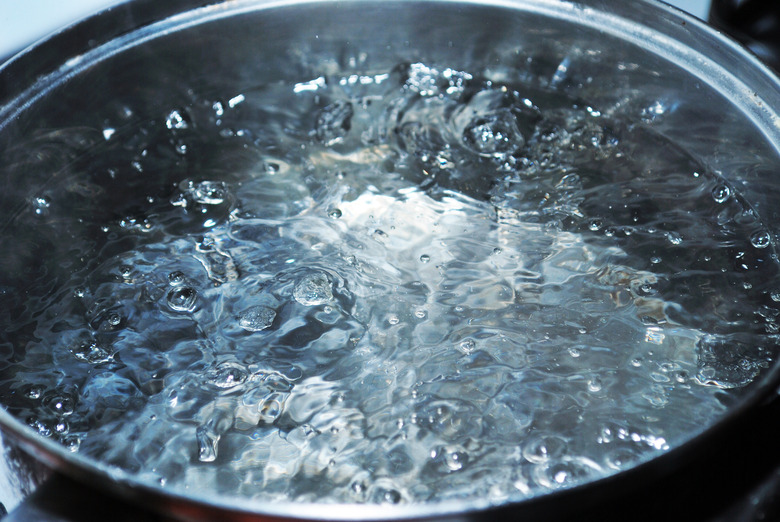What Happens To A Boiling Temperature As Pressure Decreases?
As the ambient air pressure decreases, the temperature required to boil a liquid also decreases. For example, it takes longer to make some foods at high elevations because water boils at lower temperatures; the water holds less heat so proper cooking requires more time. The connection between pressure and temperature is explained by a property called vapor pressure, a measure of how readily molecules evaporate from a liquid.
TL;DR (Too Long; Didn't Read)
As ambient temperature increases, the boiling temperatures also increase. That's because increased ambient temperature makes it hard for vapor to escape the liquid, and more energy is needed to boil.
Vapor Pressure
Vapor Pressure
The vapor pressure of a substance is the pressure of vapors exerted on a container of the substance at a particular temperature; this is true for both liquids and solids. For example, you half fill a container with water, pump out the air and seal the container. The water evaporates into the vacuum, producing a vapor that exerts a pressure. At room temperature, the vapor pressure is 0.03 atmospheres or 0.441 pounds per square inch. When the temperature increases, the pressure also increases.
Good (Molecular) Vibrations
Good (Molecular) Vibrations
At any temperature above zero kelvin, the molecules in a substance vibrate in random directions. Molecules vibrate faster as temperatures increase. The molecules do not all vibrate at the same speed, however; some move slowly while others are very fast. If the fastest molecules find their way to the surface of an object, they might have enough energy to escape into the surrounding space; it is those molecules that evaporate from the substance. As temperature increases, more molecules have the energy to evaporate from the substance, driving the vapor pressure up.
Vapor and Atmospheric Pressure
Vapor and Atmospheric Pressure
If vacuum surrounds a substance, molecules that leave the surface meet no resistance and produce a vapor. However, when the substance is surrounded by air, its vapor pressure must exceed the atmospheric pressure in order for molecules to evaporate. If the vapor pressure is lower than atmospheric pressure, molecules that leave are forced back into the substance by collisions with air molecules.
Boiling Action and Decreasing Pressure
Boiling Action and Decreasing Pressure
A liquid boils when its most energetic molecules form bubbles of vapor. Under sufficiently high air pressure, however, a liquid becomes hot but does not boil or evaporate. As ambient air pressure decreases, molecules evaporating from a boiling liquid meet less resistance from air molecules and enter the air more easily. Because the vapor pressure can be reduced, the temperature needed to boil the liquid is also reduced.
Cite This Article
MLA
Papiewski, John. "What Happens To A Boiling Temperature As Pressure Decreases?" sciencing.com, https://www.sciencing.com/happens-boiling-temperature-pressure-decreases-15811/. 27 April 2018.
APA
Papiewski, John. (2018, April 27). What Happens To A Boiling Temperature As Pressure Decreases?. sciencing.com. Retrieved from https://www.sciencing.com/happens-boiling-temperature-pressure-decreases-15811/
Chicago
Papiewski, John. What Happens To A Boiling Temperature As Pressure Decreases? last modified March 24, 2022. https://www.sciencing.com/happens-boiling-temperature-pressure-decreases-15811/
